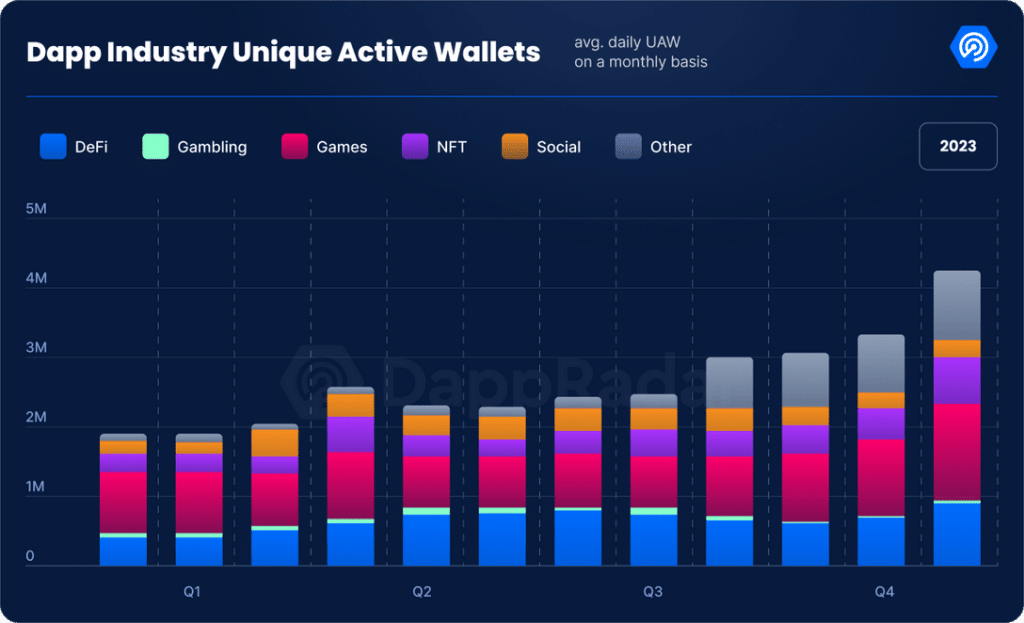BNB Chain vs. Ethereum: who is winning the dapp race?

The competition heats up in the dapp arena as developers weigh Binance Smart Chain against Ethereum. How do factors like scalability and transaction costs affect their decisions?
The blockchain space is fiercely competitive, particularly when it comes to decentralized applications (dapps).
As of Feb. 2, according to data from DappRadar, a prominent analytics platform, Binance Chain (BNB) is at the forefront with 5,215 dapps and a user base exceeding 5.3 million unique active wallets (UAW) over the last 30 days.
Ethereum (ETH), on the other hand, holds the second position with 4,497 dApps, although its user base of approximately 1.36 million UAWs pales in comparison to Binance Chain.
However, Ethereum’s dapps volume stands at an impressive $115 billion, more than six times Binance Chain’s $17.5 billion, highlighting Ethereum’s substantial developer engagement.
Amid this, Xin Jiang, a former Vice President at Binance, proposed that the market might not require further infrastructure enhancements, as dapps could emerge as the next catalysts for the crypto space.
What is happening? Let’s dive deeper into how the dapp market is performing, which chains are leading the development frontier, and which sectors are propelling the dapp market to new heights.
The current state of dapp market
According to a report from DappRadar, the dapp industry witnessed an impressive 124% year-over-year increase in its UAW, culminating in a daily count of 4.2 million UAW by the close of 2023.
Fast forward to the beginning of 2024, and the momentum shows no signs of slowing. As of Feb. 1, the dapp industry notched up a new milestone with 5.3 million daily UAW. This represents an 18% surge from the previous month and the highest since 2022.
Breaking down the numbers by industry segments provides insights into the diversification of dapp usage.

Blockchain gaming continues to lead the pack with a steady 1.5 million dUAW, maintaining its dominance from the previous month. This translates to a 28% dominance over the entire dapp ecosystem,
Similarly, the decentralized finance (defi) sector remains strong, holding steady at 1 million dUAW.
However, it’s not just gaming and finance that are driving growth. The non-fungible token (NFT) space has experienced a notable expansion, with a 4% uptick this month, reaching 697,959 dUAW.
Amid this, the social dapp sector has gained headlines, boasting an impressive 868,091 dUAW. This surge, a 262% increase over the previous month, is largely attributed to platforms like CARV and Dmail Network, indicating a surge of interest in social networking on decentralized platforms.
Rise of social dapps
The growing popularity of social dapps comes in response to increasing worries about data privacy breaches and online scams on traditional platforms.
The acquisition of Twitter by tech magnate Elon Musk in 2022 triggered a wave of discontent among its user base. Subsequent changes, like considering a paywall, led to a drop in monthly active users, expected to continue into 2024.
Amid this, social dapps like Friend.tech gained traction. Launched in Aug. 2023, Friend.tech quickly became a major player in the social crypto scene, with over 100,000 users and $25 million in revenue.
But the shift to decentralized apps isn’t just about dissatisfaction with centralized platforms. Analysts highlight that regulatory scrutiny and privacy concerns, particularly in the EU, also drive this trend.
Dapps differ from traditional platforms by avoiding centralized data collection for ads, with some being non-profit and prioritizing user privacy.
However, while decentralized platforms offer more freedom and anonymity, they also attract communities with extreme views, raising concerns about the spread of extremist content.
As of Feb. 26, based on data from DappRadar, CARV, Galxe, and Dmail Network have emerged as the foremost social dapps, gauged by total UAWs in the past 30 days.
CARV and Dmail Network have seen significant growth, with volumes up by 330% and 120%, respectively. However, Galxe has experienced a substantial decline of up to 100%.
Why is Binance Chain leading the dapp race?
When comparing Binance Smart Chain (BSC) and Ethereum in dApps performance, scalability, transaction fees, and consensus mechanisms, we gain insights into their strengths and weaknesses.
BSC stands out for its low transaction fees and high scalability, enabling swift transaction processing at a fraction of the cost compared to Ethereum.
As of Feb. 26, BSC can handle up to 45.3 transactions per second (TPS), a significant improvement over Ethereum’s current throughput, which remains under 15 TPS but aims for a substantial increase with Ethereum 2.0.
Transaction fees on Ethereum have been a persistent concern, averaging at $0.89 as of Feb. 25. During periods of network congestion, these fees can skyrocket even further, posing challenges for users and developers.
In contrast, BSC offers notably lower transaction fees, averaging at $0.15 as of this writing, presenting a compelling advantage for those seeking more cost-effective blockchain interactions.
Choosing between BSC and Ethereum depends on the specific needs and priorities of dapp developers and users. Each platform has its trade-offs in decentralization, security, transaction speed, and cost.
BSC excels in providing an efficient and economical solution for high-frequency trading and applications requiring swift transaction speeds and low fees.
On the other hand, Ethereum’s strength lies in its robust decentralization and security measures, along with a diverse array of dapps and a vast ecosystem.
The road ahead
The success of decentralized applications relies on improving user experience to make blockchain-based solutions more accessible. Simplifying interactions, refining interfaces, and incorporating familiar features are crucial to attracting a wider audience.
In today’s security-conscious digital world, dapps must also prioritize robust privacy and security measures. Innovations in cryptographic techniques like zero-knowledge proofs and secure multi-party computation will be essential for enhancing security.
While finance and gaming have dominated the dapp scene, there are opportunities for expansion into new areas such as social media, education, and healthcare.
Ultimately, the goal for dapps is mainstream adoption. Achieving this requires not just technological advancements but also educational initiatives to showcase the practical benefits of dapps in everyday life.













